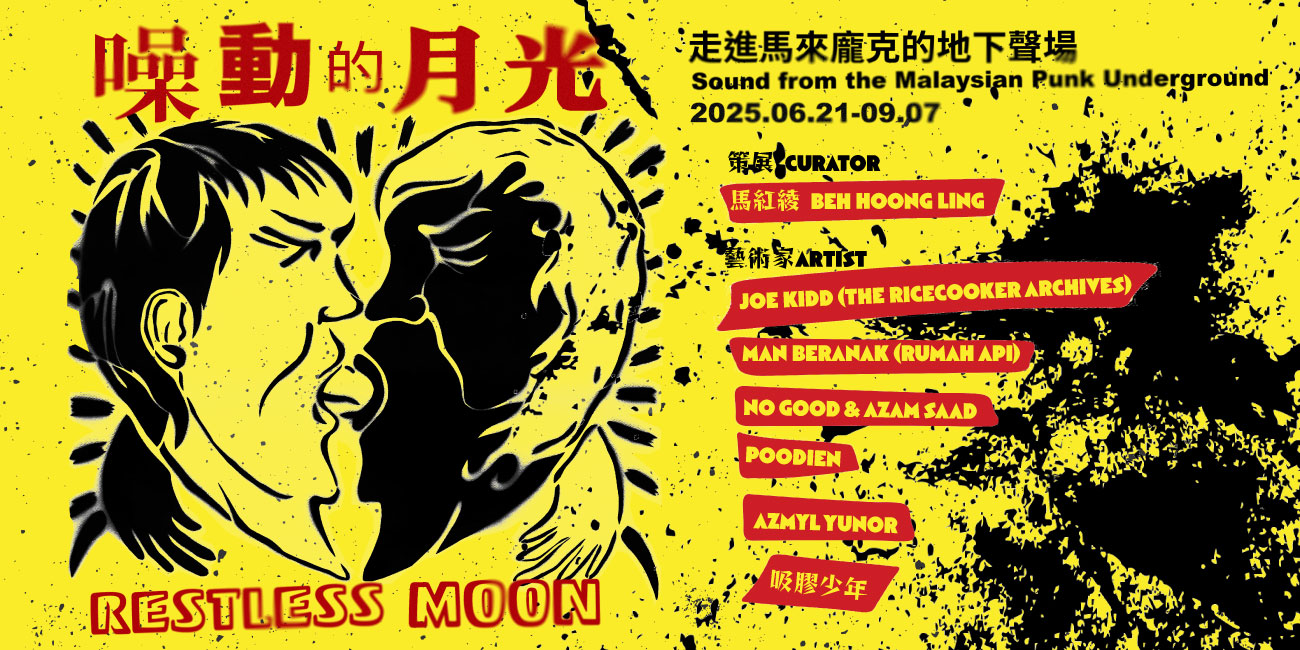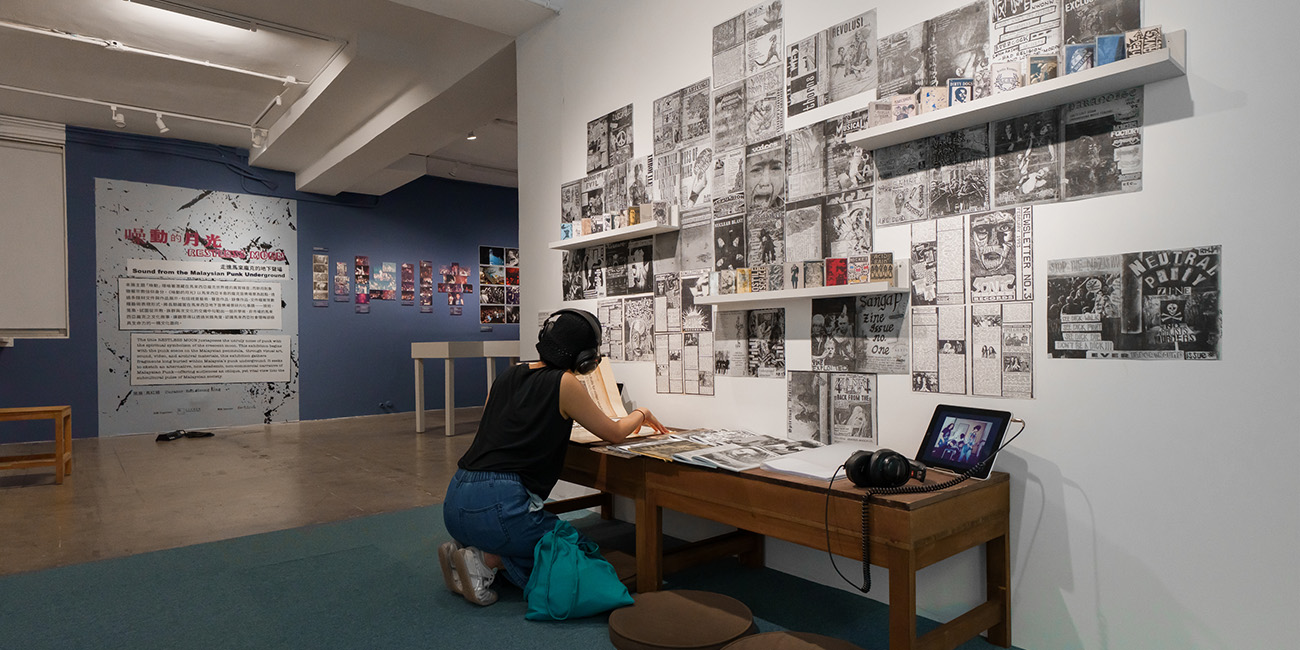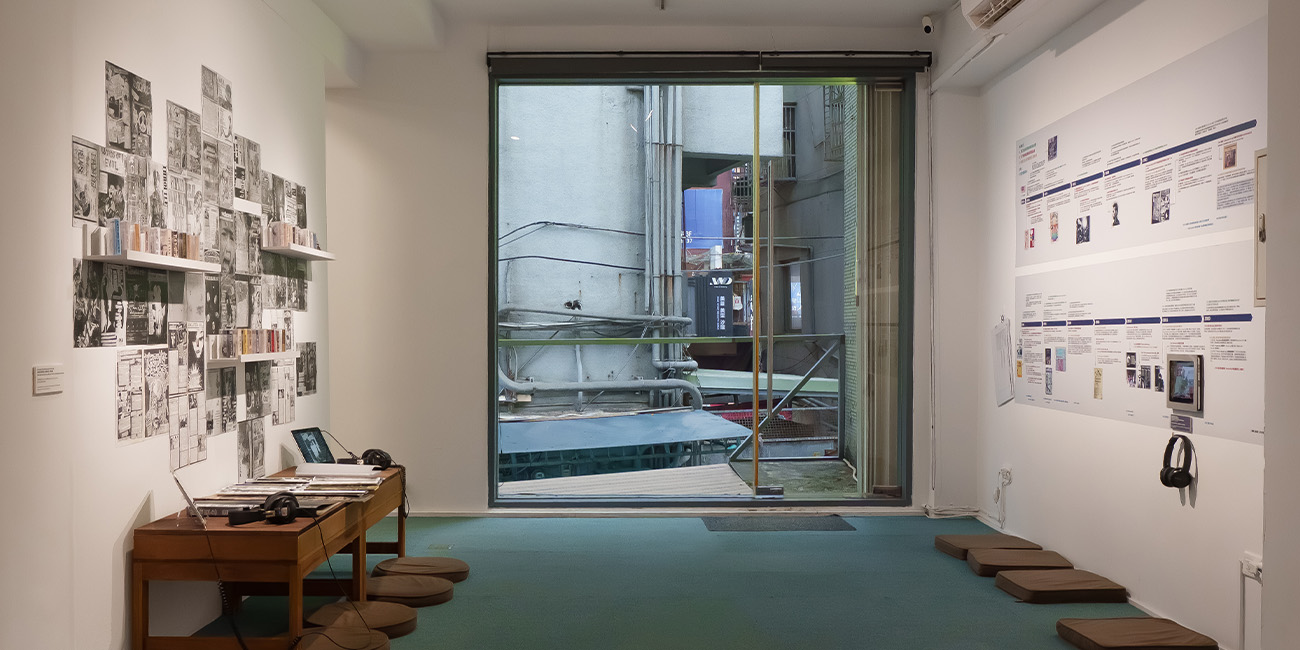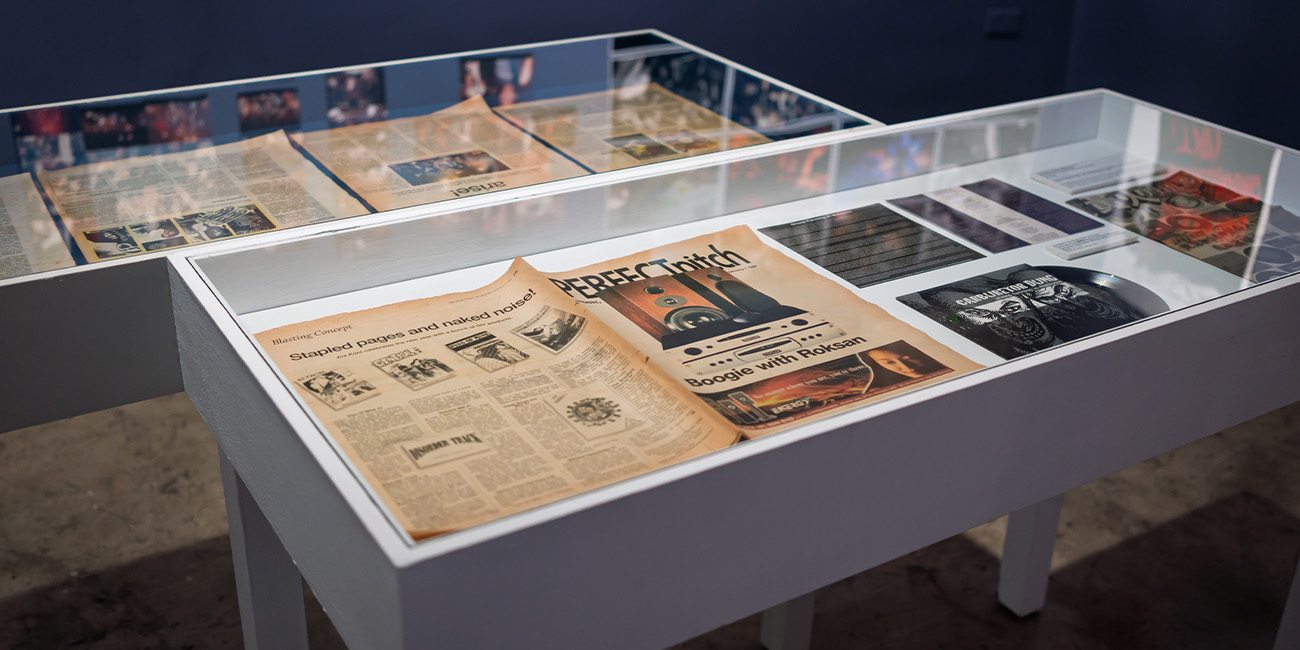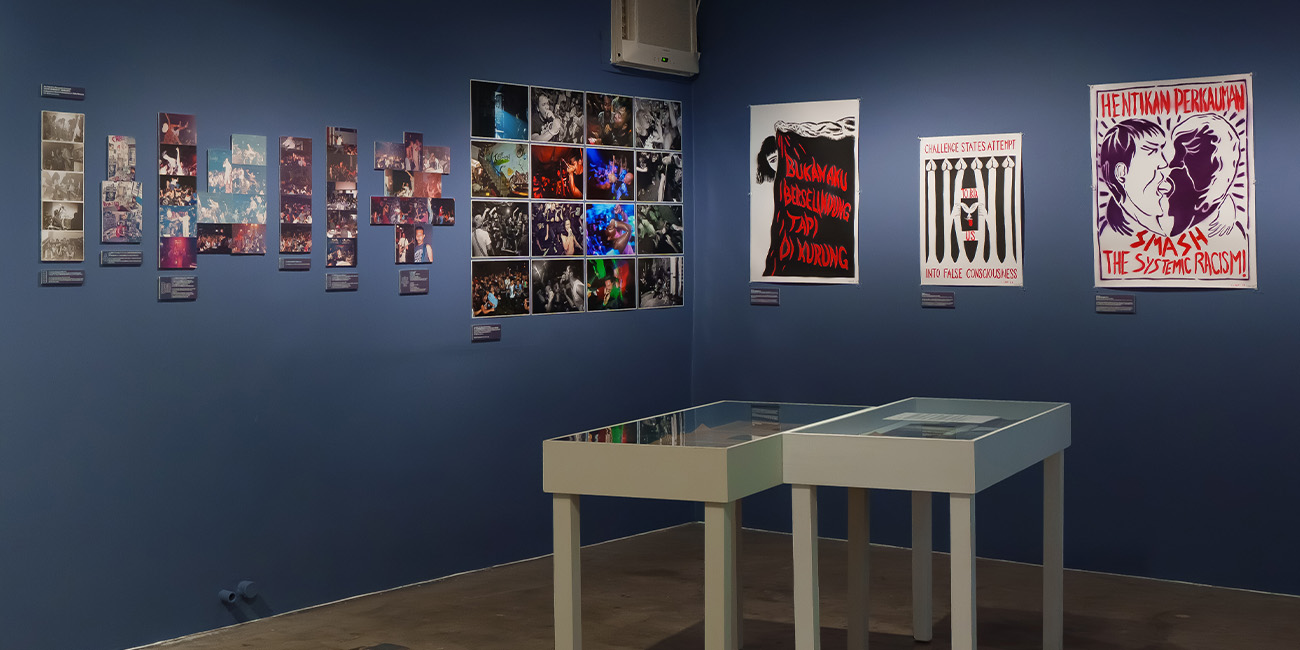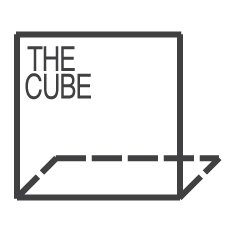TheCube Project Space is pleased to presents Restless Moon: Sound from the Malaysian Punk Underground, curated by Malaysian cultural researcher Beh Hoong Ling. The exhibition brings together key figures from Malaysia’s underground music and art scenes: Joe Kidd (The Ricecooker Archives), Man Beranak from the punk venue Rumah Api, the punk band No Good and filmmaker Azam Sa‘ad, artist Poodien, musician Azmyl Yunor, and Taiwanese punk collective Suck Glue Boys.
Through archives, visual art, sound and video works, as well as participatory workshops, the exhibition explores cultural contradictions and resistance expressed by Malay Muslim punk participants, opening a window into the lesser-known facets of contemporary Malaysian society.
* The key visual element for this exhibition was contributed by participating artist Poodien.
Curatorial Statement
By Beh Hoong Ling
In Malaysia’s underground music scene, there is a running joke: “Chinese families love mellow and harmonious music—like ABBA or The Carpenters—while Malay families are into heavier rock like Deep Purple and Led Zeppelin.” Though lighthearted and anecdotal, such remarks may reflect deeper differences in how ethnic communities perceive language and sound. In Malaysia’s multilingual society, music experiences are often tightly interwoven with linguistic choices.
Malaysia’s media and educational systems are built around multiple language streams—Chinese, Malay, Tamil, and English—each fostering distinct music cultures. Chinese-language radio is steeped in pop from China, Taiwan, Macao and Hong Kong; Malay radio stations broadcast rock music deeply influenced by Western styles; Tamil channels favor Indian classical and Bollywood sounds. People often choose their media based on their language background and social context, and each language’s media ecosystem shapes distinct musical imaginaries and emotional memories, subtly marking boundaries of cultural identity.
Genres like metal and punk in Malaysia’s underground subcultures are often dominated by Malay participants. However, Malay Muslims face unique societal pressures while participating in these scenes. Article 160 of the Malaysian Constitution defines “Malay” as someone who professes Islam, speaks Malay, and adheres to Malay customs. As a result, Malay identity is inseparable from being Muslim, and in Malaysia’s dual legal system—secular and Sharia—Islamic law applies exclusively to Muslims. For Malay Muslims, entering the punk scene involves navigating not just personal choice, but also religious, familial, social, and state regulations.
This context renders the intersection of “Malay Muslim” and “punk” a fascinating cultural contradiction. While punk emphasizes resistance, nonconformity, and defiance of authority, Islam prioritizes submission and discipline as core tenets of faith. How do Malay punk participants negotiate this contradiction? As a Malaysian Chinese outsider, the curator seeks to approach, understand, and document the predominantly Malay Muslim punk culture. This curatorial journey explores the tension and rifts among race, religion, law, and subculture—probing how individuals subtly negotiate identity and resistance within systems of control.
The title Restless Moon juxtaposes the unruly noise of punk with the spiritual symbolism of the crescent moon. This exhibition begins with the punk scene on the Malaysian peninsula, inviting artists from the scene to participate: punk godfather Joe Kidd shares rare archival materials from The Ricecooker Archives; artist Poodien contributes his stencil-based posters steeped in street aesthetics and political critique; punk band No Good is represented through a live video performance and a short documentary by Azam Sa’ad; Man Beranak contributes documentation from Rumah Api, Malaysia’s iconic DIY punk venue.
Through visual art, sound, video, and archival materials, this exhibition gathers fragments long buried within Malaysia’s punk underground. It seeks to sketch an alternative, non-academic, non-commercial narrative of Malay Muslim punk—offering audiences an oblique, yet vital view into the subcultural pulse of Malaysian society.
About the Curator
Beh Hoong Ling
Beh Hoong Ling is a cultural worker from Malaysia. She holds a degree in Drama and Visual Studies from New Era University College (Malaysia) and a Master’s in Communication Studies from National Chengchi University (Taiwan). Her practice spans across film, television, documentary, film festivals, music events, art exhibitions, writing, and research.
In Malaysia, she has worked as producer, production manager, assistant director, and scriptwriter for various film and TV projects. She also contributed as a writer to the Chinese-language film magazine MOVII Magazine. During her stay in Taiwan, she ventured into interdisciplinary practices, including concerts, exhibitions, and film festivals. She has worked as an editorial assistant for the journal Mass Communication Research and as a production managerr at CNEX documentary company.
Recently, she served as Project Manager for George Town Festival 2024, where she also curated its first Women’s Film Festival titled Women · Body. She currently works at Trees Music & Art in Taipei, where she is production coordinator and stage manager for From Port to Port, part of the 2024 Autumn Arts Festival, and production manager for the 2024 Hakka Film & Performing Arts Project — Drifing.
About the Artists
Joe Kidd
Joe Kidd is an independent cultural historian and archivist focused on music-based youth subcultures in Southeast Asia. As a pioneer of Malaysia’s punk movement, he has been a central figure in the underground scene since the late 1970s. In 1987, he published AEDES, Malaysia’s first widely distributed punk zine. In the 1990s, he founded Sonic Asylum Records and Alternative Garage Entertainment (AGE). From 1994, he wrote the influential column “Blasting Concept” for The Sun, shaping the music tastes of a generation. In the 2000s, Joe established The Ricecooker blog and later opened The Ricecooker Shop, a hub for independent music and DIY culture in the region. In 2013, he received the Asian Public Intellectuals Fellowship, conducting punk research in Manila, Jakarta, and Tokyo, and presented “The History of Southeast Asian Punk” in Hiroshima in 2014. He is currently writing a book on the subject while running The Ricecooker Archives, a personal project he describes as a “Southeast Asian Rock’n’Roll Treasury.” Splitting his time between Kuala Lumpur and Kota Kinabalu, Sabah (North Borneo), Joe continues to play guitar for one of Malaysia’s longest-running punk bands, Carburetor Dung (aka DUNG).
No Good and Azam Sa’ad
No Good emerged in 2019 as one of Malaysia’s most compelling new punk bands. They are known for their genre-defying sound that blends layered instrumentation with the Kelantanese dialect. Their lyrics critically examine contemporary Malaysian issues, including politics, religion, and identity, earning them swift recognition both locally and abroad. Their debut EP Demo Kawe (2019), released on Bandcamp, created a buzz in the DIY scene and was followed by their first full-length album Punk Gong and the “Tubik Derak Tour.” No Good won several awards at the 2020 TAPAUawards, including Best Release (Demo Kawe), Best Album Design, Best Artist, and Best Music Video.
This exhibition features a short documentary directed by Azam Sa’ad, capturing the band’s unique spirit. Azam Sa’ad is a Malaysian photographer and filmmaker active in the fields of creative and visual culture. His works often reflect a strong personal aesthetic rooted in skateboarding, underground music, and countercultural visual styles. Azam is also known for his environmental film work with Greenpeace Southeast Asia.
Poodien
Poodien lives and works in Kuala Lumpur. Heoften engages the public in conversations that prod at the conscience of Malaysian society. His work is especially concerned with issues of individual freedom and the challenge of the obsolete, unchanging, dogmatic, and supposedly foundational “truths.” Rooted in cultural activism, Poodien’s practice is deeply informed by his involvement in the DIY punk subculture. He actively participates in grassroots movements and employs guerrilla-style street art to respond to current socio-political issues. Alongside this, he maintains a more conventional studio practice that spans painting, drawing, installation, performance, printmaking, and digital collage. Through strategies of appropriation and détournement, he explores and subverts the relationship between representation, ideology, and aesthetic production.
Selected exhibitions include: Sunshower: Contemporary Art from Southeast Asia (Tokyo, Japan, 2017); If the World Changed, Singapore Biennale (Singapore, 2013); Becoming (solo show, Richard Koh Gallery, Kuala Lumpur, 2013); BARRICADE: Kuala Lumpur 7th Triennale (MAP@Publika, KL, 2013); and End Game (solo show, Galeri Chandan, KL, 2010). He also participated in Global Warming, Perfurbance #4 International Performance Art Festival (Merapi, Indonesia, 2008).
Poodien received the Malaysian Emerging Artist Award in 2009, organized by House of MATAHATI (HOM) and Galeri Chandan. Throughout his career, he has been actively involved in various art collectives—beginning during his student years—advocating for independent art and activism.
Man Beranak(Rumah Api)
Man Beranak is a key figure in Malaysia’s underground punk and hardcore scene. A member of the legendary band Sarjan Hassan, he has been active both locally and internationally. In 2010, he and his collaborators transformed a space formerly known as Gudang Noisy into Rumah Api (which translates as “lighthouse”), establishing it as a landmark venue for DIY punk culture, music, and social engagement in Kuala Lumpur.
Rumah Api is more than just a venue—it is a community space that stands for anti-classism, anti-sexism, and anti-racism. It has hosted countless punk, hardcore, and noise shows while remaining under constant threat from state surveillance and right-wing harassment. Despite repeated police raids and attacks, Rumah Api has stayed committed to its principles of resistance, autonomy, and non-hierarchical organization.
Beyond music, Man Beranak also engages in activism. He has protested against highway construction projects like SUKE, and supports initiatives such as Food Not Bombs and the Really Really Free Market—both focused on mutual aid and solidarity. He maintains strong connections with punk communities around the world, and when Rumah Api faces threats, international networks often mobilize in solidarity.
Azmyl Yunor
Azmyl Yunor is a renowned Malaysian bi-lingual independent singer-songwriter, musician, writer, gig organizer, and videomaker who started out as a street musician that adheres to the ‘three chords & the truth’ school of songwriting. As an artist-researcher, he has published his research on the cultural politics of Malaysian music subcultures and mediated moral panics, and the overlooked histories of the Malaysian underground and independent music circuit.
A founding member of several seminal underground bands in the early 2000s, his most recent solo album John Bangi Blues (2020) has been praised by fans and critics alike for “its raw power and lyrics that shuffle between satirical humour and a stiff middle finger.” He is also a Senior Lecturer at the School of Film & Performing Arts, Faculty of Arts & Social Sciences, Sunway University Malaysia. He has published academic book chapters on Malaysian music subcultures, DIY (do-it-yourself) practices, and cultural politics in the media. He has taught in the performing arts, film production, and contemporary music diploma and degree programmes. The Ethical Troubadour lecture-performance series is an ongoing project by Azmyl to engage with the creative and academic community in Southeast Asia and South Asia beyond performance spaces while on tour to encourage regional solidarity and understanding which began in 2019.
Suck Glue Boys
Founded in 2020, Suck Glue Boys is a Taiwan-based collective dedicated to promoting punk music and culture. Their work spans organizing live punk gigs, hosting DIY zine and poster exhibitions, and facilitating hands-on workshops. True to punk’s DIY ethos, their activities are fueled by collective effort and horizontal organization—eschewing hierarchy and operating by consensus.
Suck Glue Boys debuted with “T-Town No Punk,” a free guerrilla show under Dazhi Bridge, and have since participated in or hosted events like DIY or DIE Vol.2 and East Asia Big Dumb Fest (Edition 2 and 3). These guerrilla shows embody a do-it-together spirit, involving musicians, tech crew, and community members collaborating to create autonomous, inclusive spaces.
Their work also includes zine production and curation of punk-related exhibitions, reinforcing their role in nurturing local subcultural networks while fostering regional and transnational punk connections.
Organizers: TheCube Project Space
Sponsors: Department of Cultural Affairs, Taipei City Government
Dates: 21 June – 7 September 2025, 2:00 PM – 8:00 PM, Wednesday to Sunday
*Closed from 9 July to 25 July for summer break; reopens on 26 July
Venue: TheCube Project Space
Curator: Beh Hoong Ling
Artist: Joe Kidd (The Ricecooker Archives), Man Beranak (Rumah Api), No Good & Azam Sa‘ad, Poodien, Azmyl Yunor, Suck Glue Boys
Event
1. Opening & Talk: Excavating the Underground Roar: A History of Malaysia’s Punk Generation and Its Sounds
Date: Saturday, 21 June 2025, 3:00 PM
Speaker: Joe Kidd
Venue: TheCube Project Space
2. Battle Vest and Patch DIY Workshop
Date: Saturday, 26 July 2025, 2:00 PM
Host: Suck Glue Boys
Venue: TheCube Project Space
3. Lecture + Improvised Performance: The Ethical Troubadour: How To Keep It Real While Navigating Through Moral Panics And “Yellow Cultures” In Malaysia
Date: Saturday, 9 August 2025, 2:00–4:00 PM
Speaker: Azmyl Yunor
Venue: TheCube Project Space
4. Special Lecture: Sonic Crossroads: Exploring Ethnicity and Language in Malaysian Independent Music
Date/Time: August 28, 2025 (Thu) 7:30 pm – 9:00 pm
Speaker: Mak Wai Ho (MAK)
Venue: TheCube Project Space
Category:
Date:
2025 年 5 月 16 日

